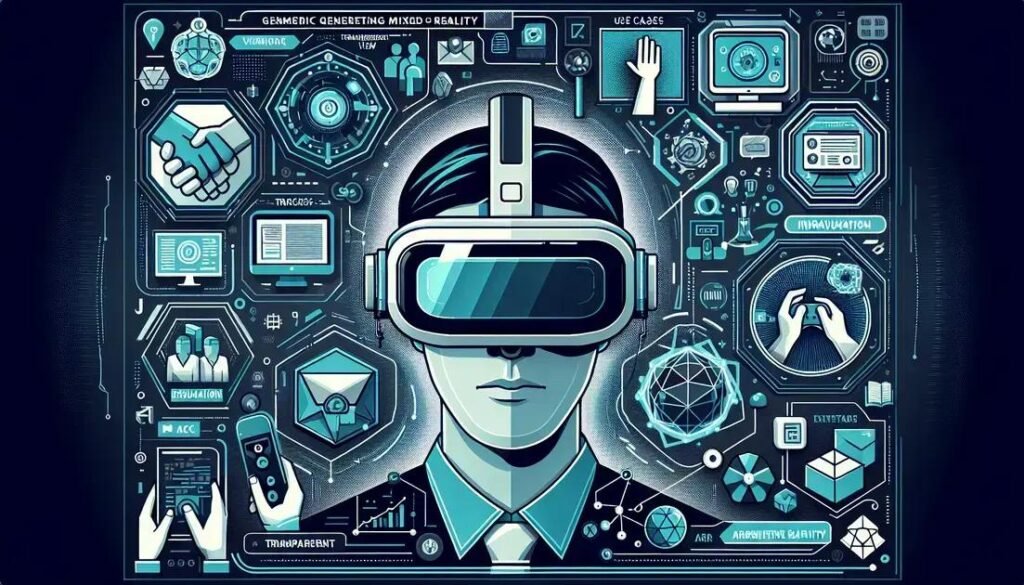Get ready to experience the future of computing with Microsoft HoloLens 2, the latest augmented reality (AR) headset that combines the powers of virtual reality (VR) and AR.
With its advanced mixed reality capabilities, HoloLens 2 is changing the way we interact and experience the digital world.
From gaming and entertainment to education and healthcare, the potential applications of AR and VR are vast.
In this article, we’ll explore the features, benefits, and limitations of HoloLens 2 and AR apps, and provide guidance on how to choose the right AR app for your needs.
1. Introduction to Microsoft HoloLens 2 and AR Apps
The Microsoft HoloLens 2 is a powerful mixed reality (MR) headset that has been gaining popularity in recent years.
With its advanced AR capabilities, HoloLens 2 is revolutionizing the way we interact with digital information and is being used in a wide range of industries, from healthcare and education to gaming and entertainment.
In this article, we’ll explore the features and benefits of the HoloLens 2, its applications in various sectors, and the advantages and limitations of using AR and VR technology.
We’ll also provide guidance on how to choose the right AR app for your needs, and discuss the future of mixed reality technology.
2. Key Features of HoloLens 2
The Microsoft HoloLens 2 boasts a range of impressive features that set it apart from other AR headsets. Some of its key features include a high-resolution see-through display, providing a crisp and clear visual experience.
Additionally, the HoloLens 2 has a built-in spatial sound, allowing users to pinpoint the source of sounds in their environment.
Its advanced hand-tracking technology enables precise and intuitive control over digital objects, while its AI-powered speech recognition allows for hands-free interaction.
The HoloLens 2 also features a long-lasting battery life, making it suitable for extended use.
Furthermore, its portable and lightweight design makes it easy to take on the go.
3. Applications of Mixed Reality Technology
Mixed reality technology has a wide range of applications across various industries. In the healthcare sector, MR is being used to train medical professionals and
enhance patient care
.
In the education sector, MR is being used to create immersive learning experiences and
increase student engagement
.
In the gaming sector, MR is being used to create interactive and immersive games.
Additionally, MR is being used in the manufacturing sector to improve product design and
streamline production processes
.
With its ability to blur the lines between the physical and digital worlds, MR is revolutionizing the way we live and work.
4. Advantages and Limitations of AR and VR
The advantages of AR and VR technology are numerous, including increased productivity, improved accuracy, and enhanced collaboration.
Additionally, AR and VR can
reduce costs
and
improve customer satisfaction
.
However, there are also some limitations to consider, such as technical requirements, cost, and user adoption rates.
Furthermore, the
limited availability of AR and VR content
can also be a challenge.
Despite these limitations, the potential benefits of AR and VR technology make it an exciting and rapidly evolving field.
5. How to Choose the Right AR App
When choosing the right AR app, there are several factors to consider. First, identify the specific needs and goals of your project or business.
Next, research and evaluate different AR apps based on their features, pricing, and user reviews. Consider the compatibility of the app with your device and any specific technical requirements.
Additionally, think about the
level of customization
and
user support
offered by the app.
Finally, test the app and its features to ensure it meets your needs. By following these steps, you can find the right AR app for your project or business.
6. Future of Mixed Reality Technology
The future of mixed reality technology is exciting and rapidly evolving. As advances in AI and computer vision continue to improve, we can expect to see more sophisticated and realistic MR experiences.
Additionally, the development of
standards and platforms
will help to accelerate the adoption of MR technology across various industries.
Furthermore, the increasing availability of affordable MR devices will make it easier for individuals and businesses to access and use MR technology.
As MR technology continues to evolve, we can expect to see new and innovative applications across various sectors, including
healthcare
,
education
, and
entertainment
.
Frequently Asked Questions about Artificial Intelligence for Small Businesses
How can task automation benefit my small business?
Task automation frees up your team from repetitive tasks, increasing productivity and allowing them to focus on more strategic tasks.
What tools can I use for data analysis?
There are various tools available, such as Google Analytics, Tableau, and Microsoft Power BI, that help collect and interpret valuable data.
What are chatbots and how do they improve customer service?
Chatbots are virtual assistants that can answer questions and resolve problems at any time, improving customer experience and freeing up your team.
How can I personalize customer experience?
Through data analysis, you can understand customers’ preferences and offer personalized recommendations and promotions.
Why is customer feedback important?
Feedback is essential to identify areas that need improvement and adjust your strategy to ensure customer satisfaction.
Is artificial intelligence accessible to small businesses?
Yes, there are various AI solutions that are accessible and scalable for small businesses to improve efficiency and customer service.



